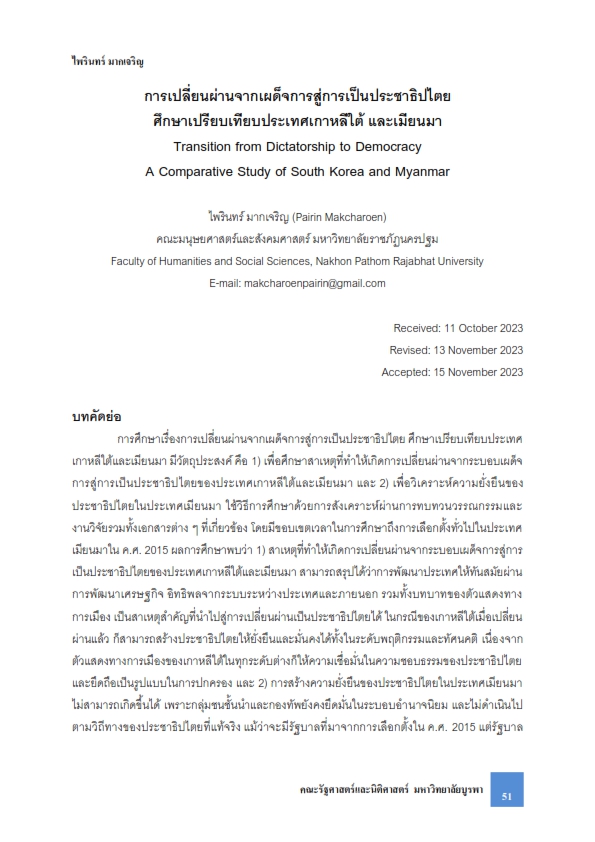Transition from Dictatorship to Democracy: A Comparative Study of South Korea and Myanmar
Keywords:
Democratic Transition, Dictatorship, South Korea, MyanmarAbstract
The study on “Transition from Dictatorship to Democracy: A Comparative Study of South
Korea and Myanmar” aimed to 1) Study the causes that led to the transition from dictatorship to democracy in South Korea and Myanmar, and 2) Analyze the sustainability of democracy in Myanmar. The study was conducted through a review of literature and research papers as well as relevant documents, focusing on the period up to the general election in Myanmar in 2015. The study found that 1) the causes that led to the transition from dictatorship to democracy in South Korea and Myanmar can be summarized as the modernization of the country through economic development, international and external influences, and the role of political actors. In the case of South Korea, once the transition took place, was able to establish a stable and enduring democracy, both in behavior and attitude, because political actors at all levels demonstrated confidence in the fairness of democracy and adhered to it as a form of governance. And 2) the establishment of a sustainable democracy in Myanmar could not occur because the leading group and the military remained committed to dictatorship and did not follow the path of true democracy. Although there was a government resulting from the 2015 election, it continued to govern in a liberal authoritarian manner, favoring large foreign businesses and the national elite.
References
รายการอ้างอิง
ภาษาไทย
ไชยวัฒน์ ค้ำชู และนิธิ เนื่องจำนงค์. (2559). การเมืองเปรียบเทียบ ทฤษฎี แนวคิด และกรณีศึกษา.
กรุงเทพฯ: สำนักพิมพ์แห่งจุฬาลงกรณ์มหาวิทยาลัย.
ธีระ นุชเปี่ยม. (2558). สารานุกรมประวัติศาสตร์ประเทศเพื่อนบ้านในอาเซียน. กรุงเทพฯ: สำนักงานราช
บัณฑิตยสภา.
ณัฐพล ตันตระกูลทรัพย์. (2556). ทุนนิยมกับการพัฒนาประชาธิปไตยในเมียนมา. เอกสารประกอบการ
สัมมนาวิชาการ สถาบันเอเชียศึกษา ปี 2556 “การเมืองและความมั่นคงใหม่ในเอเชีย” วัน อังคารที่ 17 ธันวาคม 2556. ห้องประชุมจุมภฏ-พันธุ์ทิพย์ ชั้น 4 อาคารประชาธิปก-รำไพพรรณี จุฬาลงกรณ์มหาวิทยาลัย.
ดุลยภาค ปรีชารัชช. (2554). จับกระแส ยุทธศาสตร์การเมืองเมียนมา. กรุงเทพฯ: โรงพิมพ์มหาวิทยาลัย
ธรรมศาสตร์.
ผู้จัดการออนไลน์. (2558). ผลเลือกตั้งเมียนมาล่าสุด พรรค “ซูจี” กวาด 77% รวม 880 ที่นั่งในสภา. วันที่ ค้นข้อมูล 15 กันยายน 2566, เข้าถึงได้จาก https://mgronline.com/indochina/detail/9580000127107
พิชญ์ พงษ์สวัสดิ์. (2558). ประชาธิปไตยไม่ใช่เป๊ปซี่ ว่าด้วยการเปลี่ยนผ่านจากเผด็จการจาก
มุมมองของรัฐศาสตร์. วันที่ค้นข้อมูล 15 กันยายน 2566, เข้าถึงได้จาก
http://www.ftawatch.org/node/46518
วิเชียร อินทะสี. (2556). พลวัตความเป็นประชาธิปไตยในเกาหลีใต้ : จากอำนาจนิยมสู่ประชาธิปไตยที่ มั่นคง. กรุงเทพฯ: สำนักพิมพ์แห่งจุฬาลงกรณ์มหาวิทยาลัย.
สุนทร วาที และปรัชญ์ ไพรัชกร. (2522). ล้มเผด็จการ ปักจุงฮี. กรุงเทพฯ: โคมทอง.
BBC News ไทย. (2563). เลือกตั้งเมียนมา 2020 : กับข้อครหาไม่เป็นประชาธิปไตย.
วันที่ค้นข้อมูล 1 กันยายน 2566, เข้าถึงได้จาก https://www.bbc.com/thai/international- 54820800
ภาษาอังกฤษ
Dickovick, J. T., & Eastwood, J. (2016). Comparative Politics: Integrating Theories, Methods,
and Cases (2nd edition). USA: Oxford University Press.
Inglehart, R., & Welzel, C. (2005). Modernization, Cultural Change, and Democracy: The Human Development Sequence. New York: Cambridge University Press.
Huntington, S. P. (1991). The Third Wave: Democratization in the Late Twentieth Century.
London: University of Oklahoma Press.






